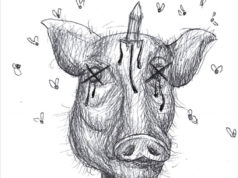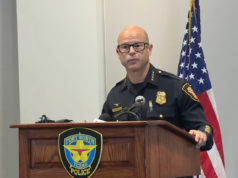Red flags were waving madly after the Press Club of Dallas’ 48th annual journalism awards banquet last November. Sure, Fort Worth Weekly toasted its good fortune after winning several of the gold statuettes – known as Katies – but the writers couldn’t help noticing that Press Club president Elizabeth Albanese won four awards for stories written for a publication called, yawn, The Bond Buyer.
Should the Weekly’s hotshot investigative reporters look into the problem? …. Naah. Too much insider baseball for the readers to care about, too much self-interest on said reporters’ part.
Fortunately, the Dallas Business Journal saw the same red flags and pursued the story (“Questions Dog Dallas Press Club,” April 14, 2007). Turns out, Albanese’s clean sweep of awards was the tip of the iceberg. The Biz Journal reports that the Press Club has been unable to produce the names of any of the judges who should have examined the approximately 2,000 stories submitted in the contest. Albanese told the newspaper she kept no records of the judges. Worse, she had charged $10,000 worth of personal expenses (which she said she’s paid back) on the nonprofit’s credit card and, amid questioning, she resigned. The Press Club board has appointed a group to investigate and promises to get to the bottom of the mess. In the meantime … wonder if the Biz Journal will win a Katie next year for its investigation of the Katies?
Domestic Tragedies
Static figures the second-guessing of police and college officials in Blacksburg, Va., is mostly pointless: A college is not a high school where a couple of teachers can lock the doors and broadcast warning on the PA system. It’s more like a small city, with no way to alert everyone instantly.
But there are a couple of points that college honchos across the country might well consider. The first is the explanation Virginia Tech officials gave for not immediately e-mailing an alert to students and taking other preventive measures when they found the first two victims in the dorm: They thought the earlier shootings were “domestic in nature.”
This is a mind-set that seems to afflict many law enforcement bodies. “Domestic” killers, the feeling seems to be, probably won’t hurt anybody else – so why raise a general alarm? Around the country, the bodies of thousands of abusers’ children, family members, co-workers, and bystanders bear testament to the falsity of that assumption. A corollary is the official attitude on many campuses toward rape. As the Weekly’s reporting, and that of a number of college newspapers, has shown, if an assault is deemed “date rape,” police officers frequently fail to report the crime to the student body and to federal officials, as required by law. Again, the assumption is that the rapist is not a danger to anyone else. (Sure – except for the next acquaintance he rapes, and the one after that.)
The other point is that the federal law mentioned above, called the Clery Act, requires colleges to keep their students apprised of crime nearby, including by issuing campuswide alerts.
If such an alert had been issued as soon as officials found the first bodies in that Virginia Tech dorm, rather than a couple of hours later, it probably wouldn’t have changed most of what happened. But it might have caused people to pay attention faster to the sounds of that second deadly round of shots – to react more quickly. And the difference might have been a few lives saved from that “domestic” killer.











